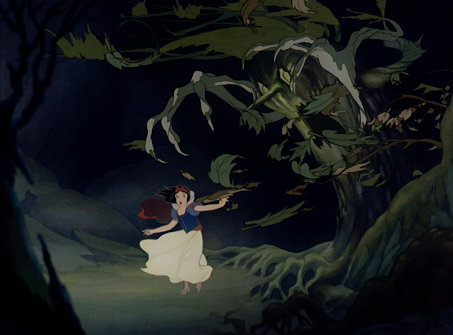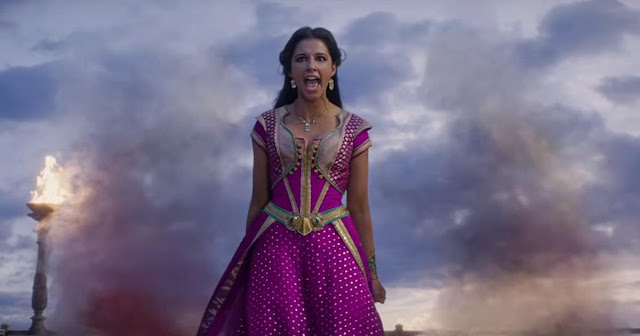"Be Pretty, Girls, and Things Might Work Out."
Just when I thought I'd put this discussion to rest, a New York Times article went viral a couple days ago that did a profile on Sean Bailey, the main in charge of Disney's long-running slate of live-action remakes. According to the author of the article, Brooks Barnes, Bailey's remakes are "crucial to [Disney] remaining relevant" because the animated classics they cover "showcase ideas from another era" such as "Be pretty, girls, and things might work out." Really? That's all you got out of these inspirational works of art? Are we doing this again? It looks like we're doing this again.
Let's start with the next upcoming live-action remake, Snow White, starring Rachel Zegler. Some might argue that this movie is a good example of one that needs an update because so much of the story is focused on the protagonist's physical appearance. Is that really what saved her in the end? Nope. Not at all. In fact, the queen's jealous of Snow White's beauty is the very thing that caused her to nearly get killed by the huntsman and then run through the woods on a treacherous trek for her life. But it's okay. After that, the dwarfs and the prince found her and were so taken by her beauty that they took her in told her she'd never have to worry about the queen again, right? Wrong. She had to use her natural goodwill and kindness to convince her animal friends to bring her to safe haven where she needed to earn her keep with a little hard work, similar to a more modern Disney Princess that we know.
But what about Cinderella? Didn't she get away from her stepfamily solely because the prince was charmed by her beauty, something that the live-action remake tried to correct? This is a harder one. Yes, the 1950 Disney animated classic did have the prince fall in love with her in a single night for seemingly very little reason other than her appearance, but that was not the final message of the movie. If it was, then marrying the prince would have been the only thing Cinderella did in the entire movie. Instead, it showed her day-to-day life doing chores for her family and taking their abuse with a monumental amount of self-control. It was her fortitude in remaining kind and gentle and never breaking down for so long that earned her the chance to become the graceful elegant woman at the ball instead of giving up and submitting to a life of misery. The moral of the story was perseverance, not being pretty, which I don't think is the moral of any story. Of course, there were plenty of other "Cinderella" adaptations that showed her getting to know the prince before the ball as well, so the remake was far from revolutionary.
The later generations of princesses were even more blatant in their feminist values, yet that didn't stop Disney from doing second-rate remakes of The Little Mermaid, Beauty and the Beast, Aladdin, and Mulan, claiming that these were more feminist than the originals. As someone who grew up with these animated films, I can attest that the original versions of the characters were just as inspirational, if not more so, than the ones from the remakes, particularly in the case of Mulan. All of the princesses from these movies saved their princes at some point in the original film. Ariel saved Eric from drowning. Belle broke the Beast's curse with the power of true love. Jasmine spoke out against he guards and Jafar for Aladdin's arrest. Mulan took an arrow for Shang. All of these characters were active players in their own story. People are entitled to like or dislike the remakes as they please, but the claim that they fix outdated gender roles from the originals is simply inaccurate.
Disney's live-action remakes continue to be a hotly debated topic, and the recent article on Sean Bailey only add fuel to the fire. While some may argue that remakes serve as an important means for Disney to remain relevant, there are concerns about the messages being portrayed, particularly regarding gender and beauty. However, it's important to note that the original versions of the animated classics were not without their own feminist values, and it's possible for the remakes to achieve both a nostalgic appeal and progressive messaging. At the end of the day, it's up to Disney to weigh the importance of both factors and make decisions that align with their values and audience. What do you think are some of the messages behind the original animated films? Let me know in the comments!
Let's start with the next upcoming live-action remake, Snow White, starring Rachel Zegler. Some might argue that this movie is a good example of one that needs an update because so much of the story is focused on the protagonist's physical appearance. Is that really what saved her in the end? Nope. Not at all. In fact, the queen's jealous of Snow White's beauty is the very thing that caused her to nearly get killed by the huntsman and then run through the woods on a treacherous trek for her life. But it's okay. After that, the dwarfs and the prince found her and were so taken by her beauty that they took her in told her she'd never have to worry about the queen again, right? Wrong. She had to use her natural goodwill and kindness to convince her animal friends to bring her to safe haven where she needed to earn her keep with a little hard work, similar to a more modern Disney Princess that we know.
Because Barnes' article references this movie in a paragraph about emphasizing diversity, I can't resist wondering if he's trying to make some sort of dig towards people of color by saying they are replacing the "be pretty" message with diversity. I admit this may be a stretch, but saying both of these things in the same article could be interpreted as a claim that diverse people are less beautiful than the white princesses we've seen in older movies, which, of course, isn't true. That's just another reason that Bailey and the remake team need to start rethinking their messaging strategy.
But what about Cinderella? Didn't she get away from her stepfamily solely because the prince was charmed by her beauty, something that the live-action remake tried to correct? This is a harder one. Yes, the 1950 Disney animated classic did have the prince fall in love with her in a single night for seemingly very little reason other than her appearance, but that was not the final message of the movie. If it was, then marrying the prince would have been the only thing Cinderella did in the entire movie. Instead, it showed her day-to-day life doing chores for her family and taking their abuse with a monumental amount of self-control. It was her fortitude in remaining kind and gentle and never breaking down for so long that earned her the chance to become the graceful elegant woman at the ball instead of giving up and submitting to a life of misery. The moral of the story was perseverance, not being pretty, which I don't think is the moral of any story. Of course, there were plenty of other "Cinderella" adaptations that showed her getting to know the prince before the ball as well, so the remake was far from revolutionary.
The later generations of princesses were even more blatant in their feminist values, yet that didn't stop Disney from doing second-rate remakes of The Little Mermaid, Beauty and the Beast, Aladdin, and Mulan, claiming that these were more feminist than the originals. As someone who grew up with these animated films, I can attest that the original versions of the characters were just as inspirational, if not more so, than the ones from the remakes, particularly in the case of Mulan. All of the princesses from these movies saved their princes at some point in the original film. Ariel saved Eric from drowning. Belle broke the Beast's curse with the power of true love. Jasmine spoke out against he guards and Jafar for Aladdin's arrest. Mulan took an arrow for Shang. All of these characters were active players in their own story. People are entitled to like or dislike the remakes as they please, but the claim that they fix outdated gender roles from the originals is simply inaccurate.














Comments
"Being the most beautiful" has really made many women miserable, envy, jealousy, bullying in some cases (as with Snow White) beauty is not the answer to all questions and we cannot simplify the message of classic tales into " be nice and everything will be fine".
Not to mention that it's so contradictory... on the one hand modern messages say "beauty is diverse of all colors, sizes and races all girls are beautiful!" and then they say that somehow femininity, beauty and the messages of traditional movies are bad for girls...what are we left with, are they all beautiful in their own way and therefore perfectly fine we can stop watching stories like Snow White as "bad" because you know... we're all beautiful or somehow we should keep getting mad because beauty is mentioned? Getting angry with the mere concept of beauty is not, in turn, validating that there are "ugly" people because they do not adapt to the current cannon? if all girls are beautiful then perfect Snow White was beautiful and so are all of us! Cinderella's prince was speechless when he saw her? Well, my grandfather also saw my grandmother for the first time and she was not blonde nor did she have a wasp waist.
Really...they should think better about their arguments, don't use argumentative fallacies and accept that this "gender role correction" could in turn be corrected again in a few years by another generation... or who knows maybe in 50 years they decide that the animated versions were better. Or make new ones.
Or better yet, let's just forget about the roles and let the characters do what they should do according to their character and that's it.
The article mentioning diversity raises an interesting point. It's important to consider whether the emphasis on diversity is meant to replace the "be pretty" message. It's crucial to recognize that diverse individuals are just as beautiful as the white princesses we've seen in older movies. This highlights the need for the remake team to rethink their messaging strategy.
It's exciting to see these discussions taking place, as they encourage us to challenge and improve upon traditional narratives.